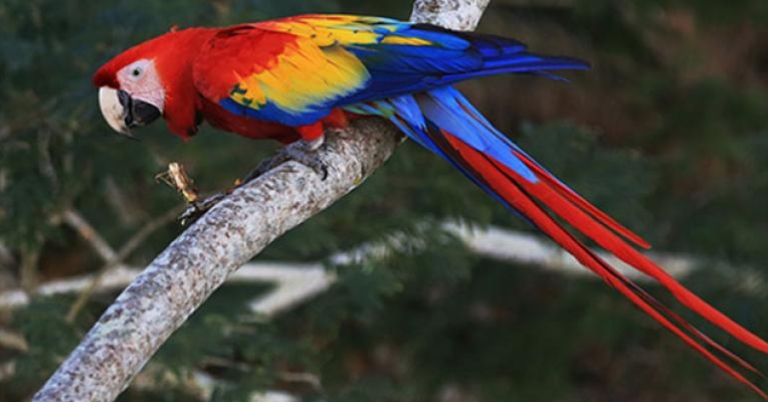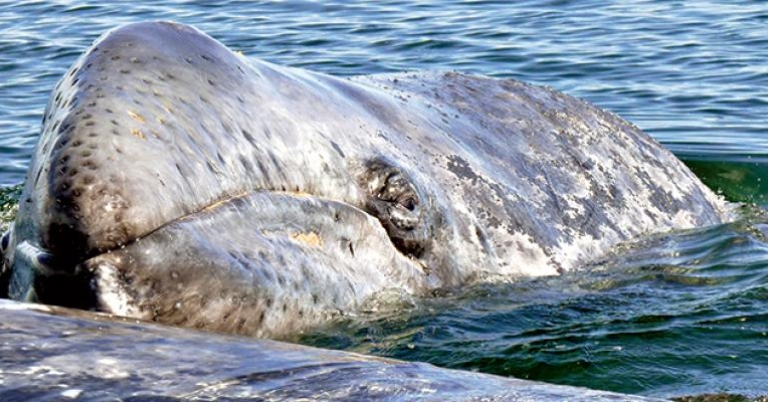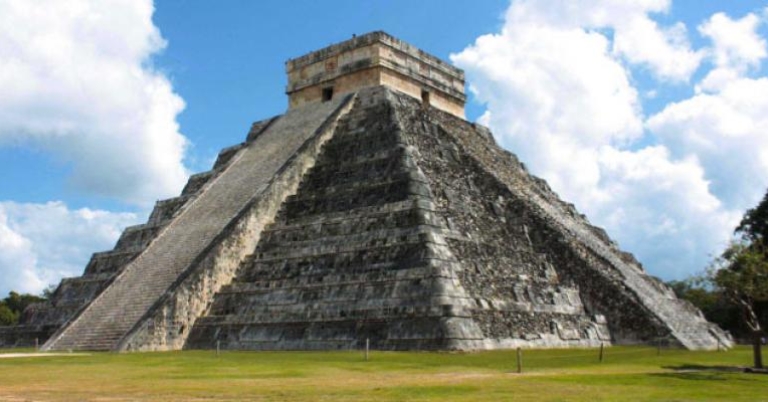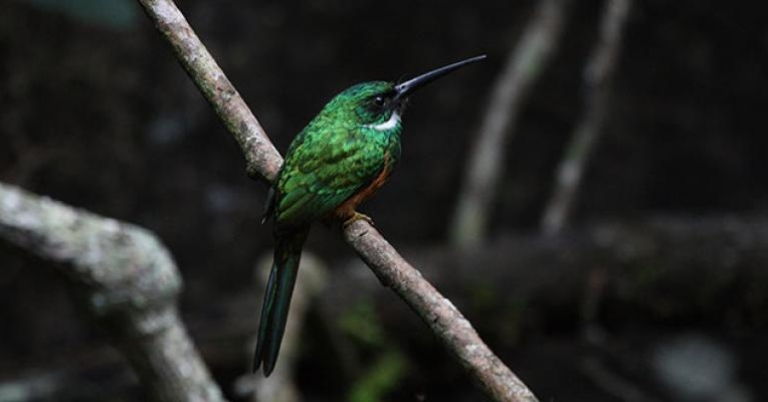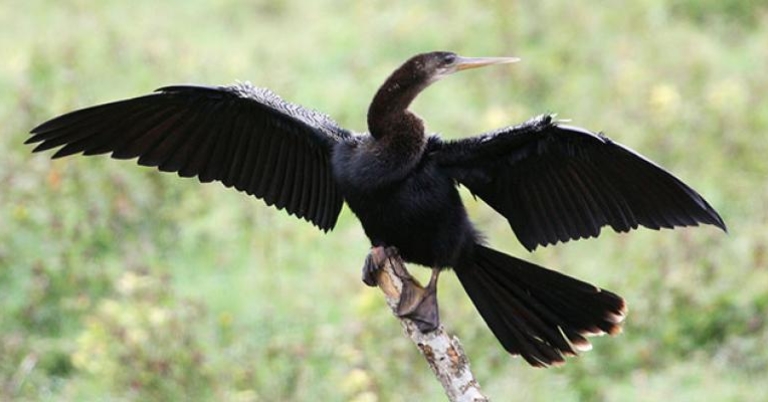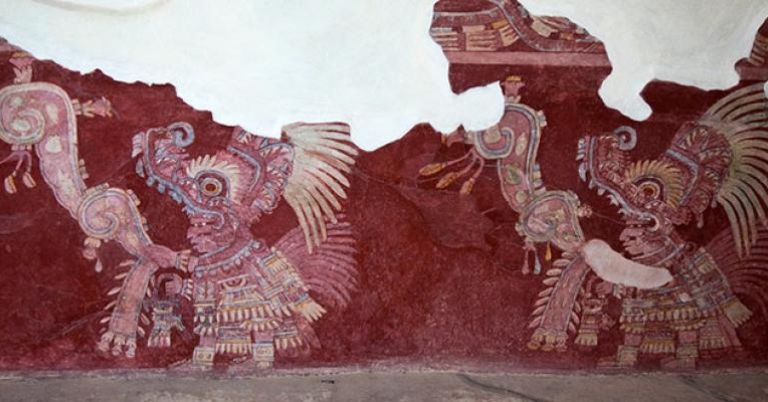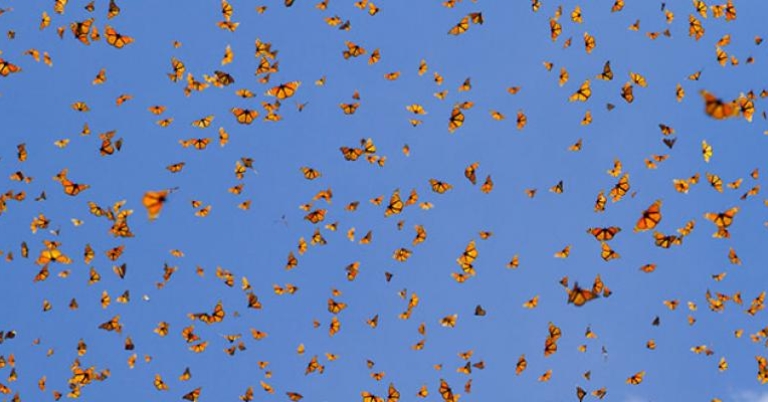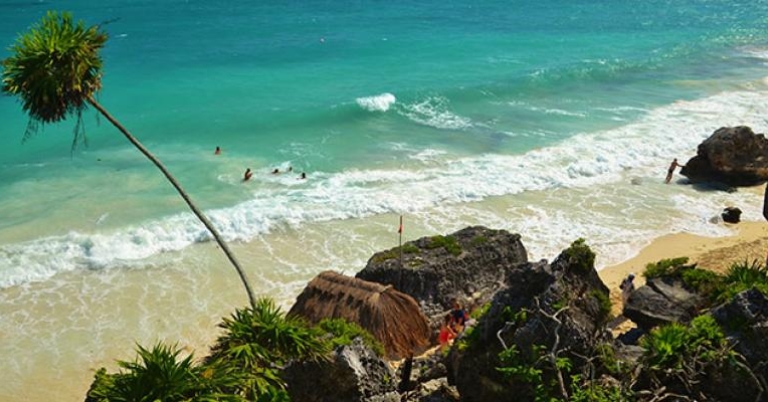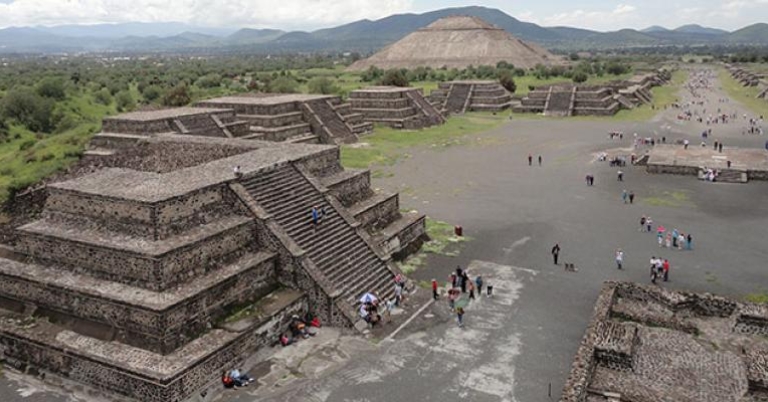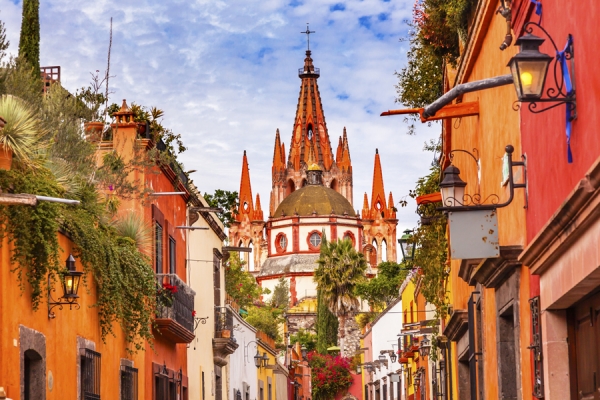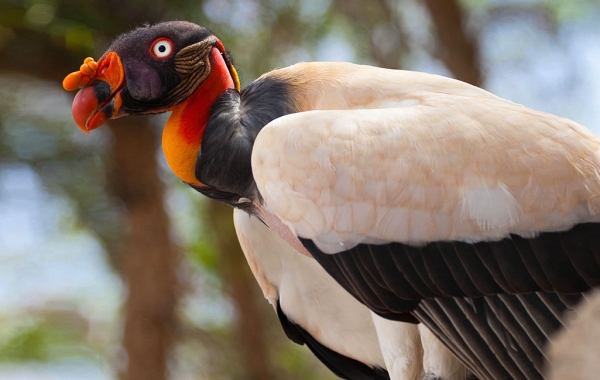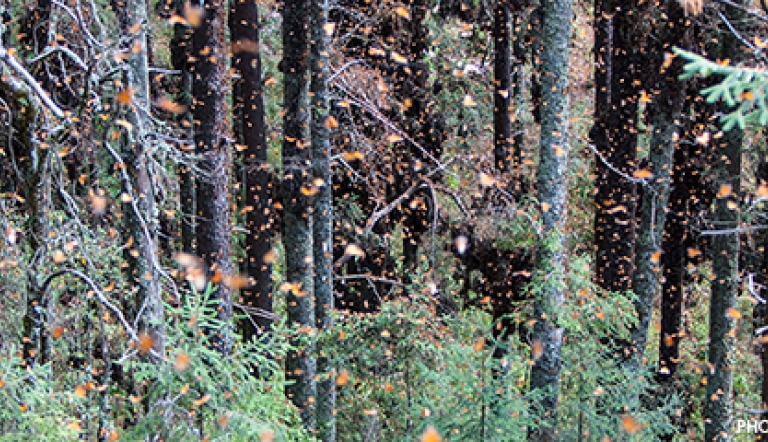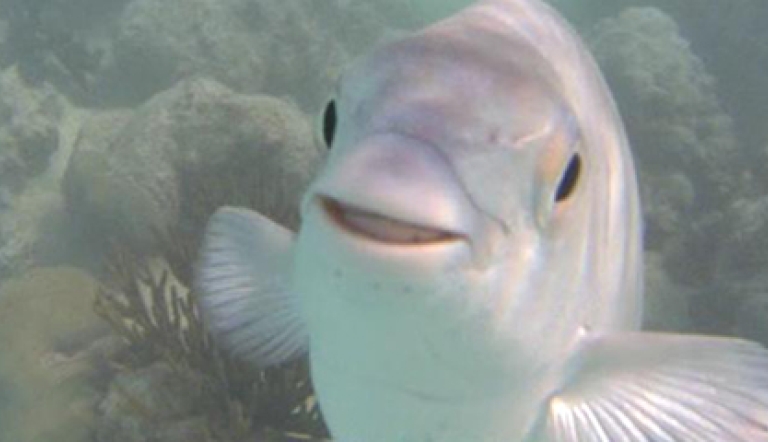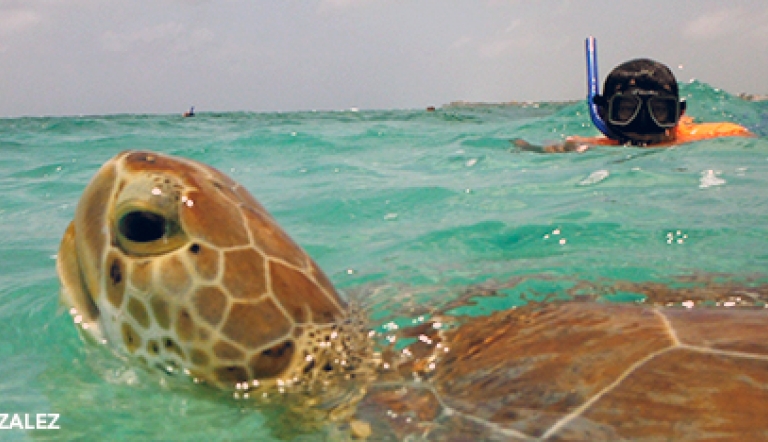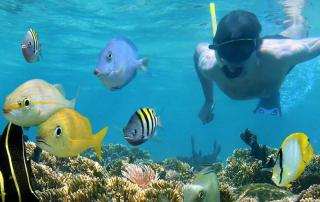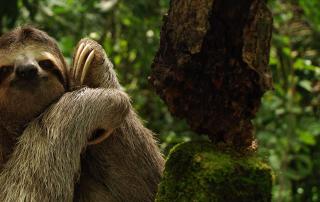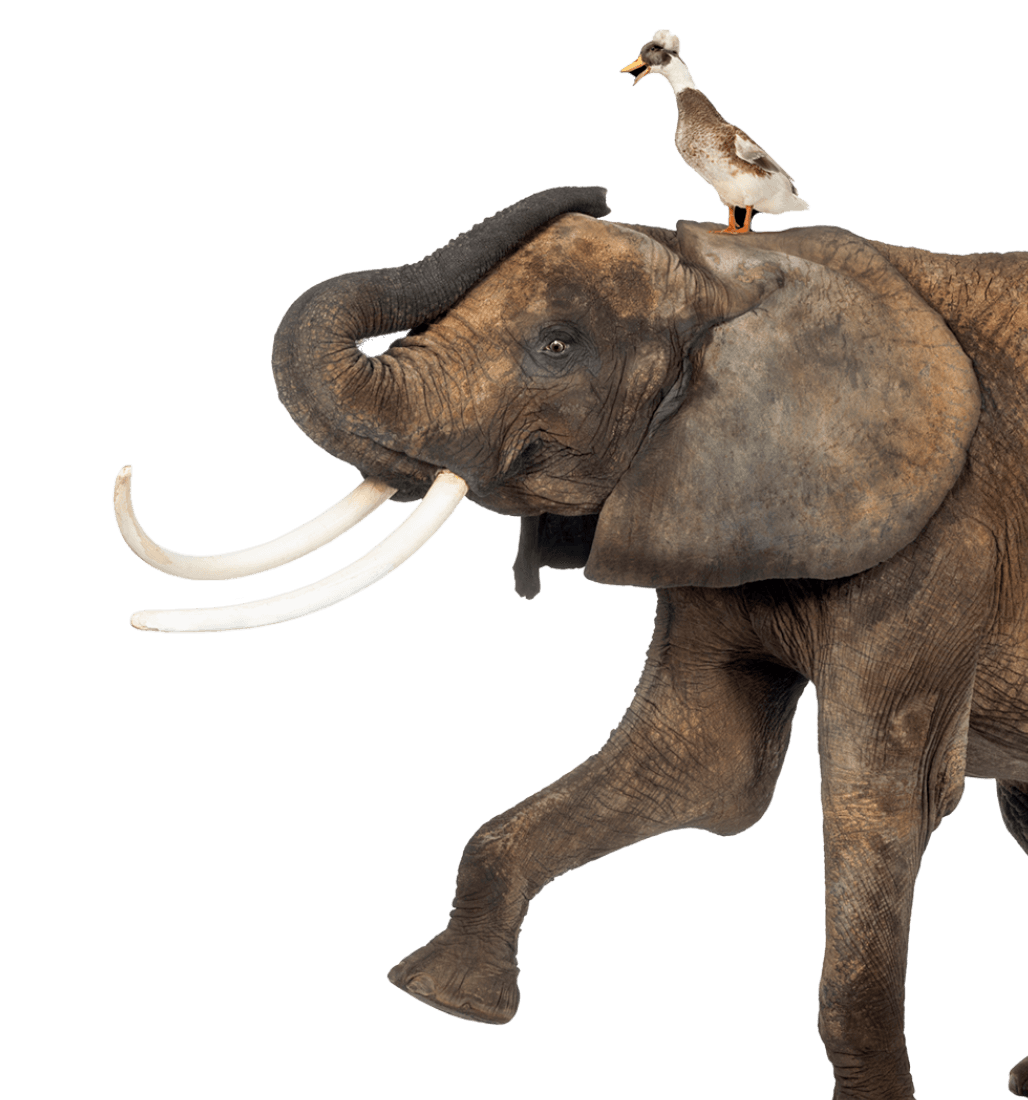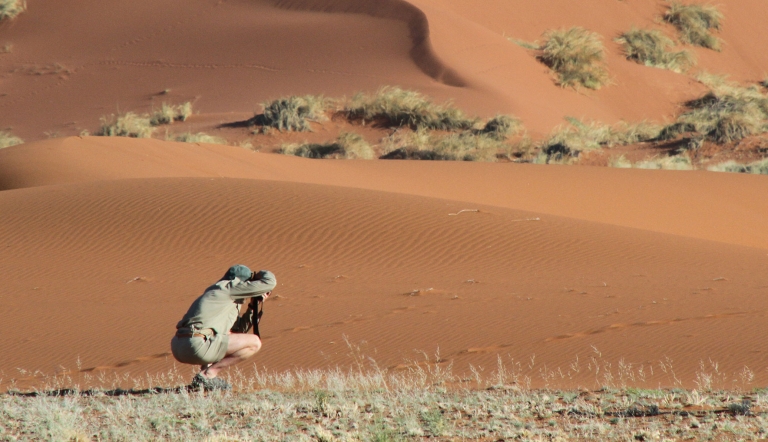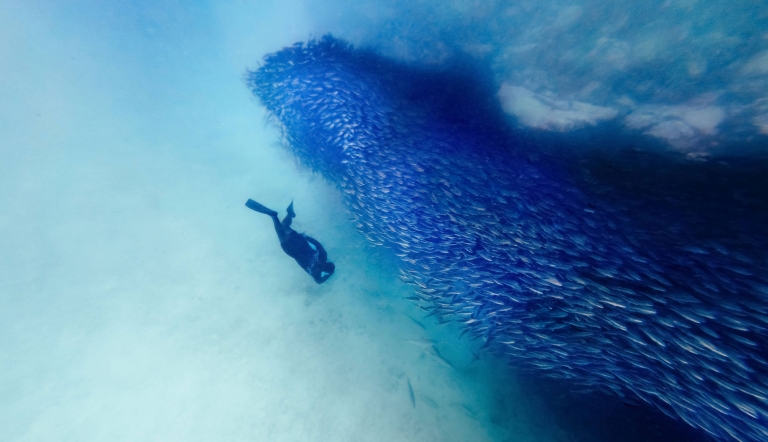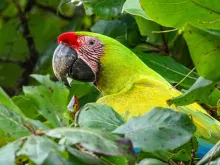Considered to be one of the 18 megadiverse countries in the world, Mexico is home to 200,000 different species, making it accountable for 10 to 12 percent of the world’s biodiversity.
Travelers visiting Mexico can observe native wildlife, including sea turtles, Monarch butterflies, whale sharks, and the endemic Balsas Screech-Owl, while exploring Mexico’s diverse habitats, which range from mountain pine forests and jungles to ocean basins and endless sea. Located in the northwest of Mexico, the Baja Peninsula is the site of one of the most extraordinary natural phenomena on the planet. Every year, gray whales travel 5,000 miles to Baja to mate and deliver their calves. With more than 747 miles of coastline, Baja offers endless educational maritime activities. For those who enjoy staying dry and on land, the Baja Desert, Mexico’s best preserved desert, offers a rich diversity of plants and animals to observe. In addition to its acclaimed natural wonders, Mexico is renowned for its astounding cultural artifacts. Mexico’s Yucatán Peninsula, which has the largest indigenous population in North America, is home to many Mayan archaeological sites. Feel the might of the Maya at the astonishing ruins of the Chichén Itzá and become immersed in the history and tradition of Mexico’s mythical land. Birders can observe Yucatán’s 500-plus avian species soar through ancient, picturesque background, while adventurers can climb towering pyramids, kayak on striking waterways, zip through jungle canopies, and snorkel in underground caves. From deep oceans of Baja to the soaring pyramids of Uxmal, Mexico is home to an endless variety of sights, cultural experiences, and natural beauty. Whether you’re a photographer, scientist, birder, or simply an avid traveler, Holbrook can deliver an enriching experience for you and your group.
Ecosystems
Mexico is a land of extraordinary variety. Though the widely known beach resorts of Cancún, Cozumel, and Acapulco offer luxury and relaxation, a venture beyond their walls reveals Mexico’s real treasures: lowland tropical forests, offshore coral reefs, intertidal marshes, high desert, pine-clad mountains, and karst limestone caverns and sinkholes all providing thriving habitats for fauna.
Flora & Fauna
Abundant wildlife can be found in Mexico, including more than 450 mammal species, 30,000 plant species, 693 different reptiles, and 2,000 species of fish including Whale Sharks, the world’s largest fish. More than 1,000 endemic and migratory birds have been recorded, including Yucatán Woodpecker, Rose-throated Becard, and Yellow-lored Parrot. Among the world’s most astounding natural phenomena, the annual winter migration of millions of Monarch Butterflies paints a blanket of orange across the southern end of the central Mexican plateau.
Culture & History
Tiny indigenous villages, ultra-modern resort communities, ancient relics, and bustling metropolitan centers all coexist within Mexico’s 761,600 square miles. This juxtaposition of old and new provides a fascinating cultural contrast that stretches back to when Mexican civilization began to flourish. The Olmec, Maya, Toltec, and Aztec cultures that inhabited Mexico for more than 3,000 years created advanced artistic, technical, agricultural, and religious traditions that survived Spanish colonization. Traveling to the ruins of Cobá, Chichén Itzá, Oxtankahand, and many other archaeological sites in Mexico is a riveting journey through the ancient Maya world. History remains alive in modern-day Mexico, where colonial churches are still the community gathering place, and Maya still uphold many of their ancient traditions.
Sustainability
Mexico seeks to gain strength from its cultural and natural diversity. The government established biosphere reserves to preserve its biological habitats, which have since become models of preservation and important sites for environmental research. Private conservation groups lead environmental education workshops throughout the country to teach local communities how to manage their natural forests and land in sustainable ways including composting, gardening, beekeeping, and crop rotation.
Entry & Exit Requirements
U.S. citizens must have a valid passport to enter Mexico. Passports must be valid for at least the duration of your stay. As this requirement is subject to change at any time without notice, we recommend at least 6 months’ validity. A passport card is not acceptable for entry to the U.S. by air.
Travelers no longer need to fill out the Forma Migratoria Multiple (FMM), also known as the tourist card, if flying in and out of the following airports: Mexico City International Airport (MEX), Cancun International Airport (CUN), Cozumel International Airport (CZM), Los Cabos International Airport (SJD), or Puerto Vallarta International Airport (PVR).
If you are flying in and out of an airport other than those listed above, Mexico still requires submission of an immigration form (tourist card) upon arrival. There is no fee for the form, but it is recommended that you complete the form online at https://www.inm.gob.mx/fmme/publico/en/solicitud.html and print it prior to your departure. While the form will also be available upon arrival, printing the tourist card prior to your trip will expedite your arrival process. For more information about the tourist card, visit https://www.mexicotouristcard.com.
If you are not traveling with a U.S. passport, please check with the Mexican Embassy for the requirements based on your nationality.
Health Information
IMMUNIZATIONS
The Centers for Disease Control recommends that all travelers be up to date on routine vaccinations such as measles-mumps-rubella (MMR) vaccine, diphtheria-pertussis-tetanus vaccine, varicella (chicken pox) vaccine, and your yearly flu shot before every trip.
There are no vaccinations required for entry into Mexico, unless you are traveling from an endemic yellow fever area within six weeks prior to entry.
Some physicians recommend that travelers get hepatitis A and typhoid vaccines before visiting Mexico.
Please consult your physician for additional information and recommendations based on your individual circumstances.
MALARIA
The CDC warns that travelers to Central America may be at risk for exposure to malaria. Malaria is caused by a parasite found in Anopheles mosquitos, which are active from dusk until dawn. Prevention is twofold: the use of anti-malarial drugs and the prevention of insect bites. If you choose to use an anti-malarial drug, as recommended by the CDC, see your physician for a prescription.
ZIKA VIRUS
Locally transmitted cases of Zika virus have been reported in Mexico. Local transmission means that mosquitoes in the area have been infected with Zika and are spreading it to people. The CDC recommends that travelers to Mexico protect themselves from mosquito bites. As a precaution, the CDC advises women who are pregnant to consider postponing travel to any area where Zika virus transmission is ongoing.
SUN EXPOSURE
The effects of the sun can be damaging to the eyes and skin. Spending time outdoors exposes you to the sun’s harmful ultraviolet (UV) rays, even on cloudy days. To protect yourself from the sun, use a broad spectrum sunscreen of at least SPF 15, protect skin with clothing, wear a wide-brimmed hat and sunglasses, and drink plenty of fluids.
Currency
The currency of Mexico is the peso.
Electricity
The electrical current in Mexico is usually 110V 60Hz AC, the same as in the United States. Travelers from the United States do not need a converter.
Time Zone
Mexico uses four main time zones. Most of the country uses Central Standard Time (UTC-06:00). The Mexico states of Chihuahua, Nayarit, Sonora, Sinaloa and Baja California Sur use Mountain Standard Time (UTC-07:00), and Baja California Norte uses Pacific Standard Time (UTC-08:00).
Most of Mexico observes Daylight Saving Time.
Departures and arrivals on flight schedules are listed in the local time.
Communications
PHONES
Mexico’s international calling code is +52.
To call Mexico (from the U.S.): Dial 011-52-(xx-xxx-xxxx)
To call the United States: Dial 001-(xxx-xxx-xxxx)
Pre-paid phone cards are sold in Mexican supermarkets, tobacco shops, and airport stores. Although international calls can be charged to your hotel room, it is usually a more expensive option, so be sure to check hotel phone rates prior to making any calls.
Please check with your cell phone provider if you’re unsure whether or not your cell phone will work internationally. Be aware that you are likely to incur additional charges for international use.
INTERNET
WiFi is widely available and can be found at most hotels.
Reading List
FIELD GUIDES
Field Guide to the Birds of Mexico and Adjacent Areas, Belize, Guatemala, and El Salvador
Ernest Preston Edwards
This classic guide illustrates all the regularly occurring birds of Mexico and neighboring areas, including details of distribution, abundance, habitat and identification features for 850 species.
Snorkeling Guide to Marine Life
Paul Humann
Humann's compact guide illustrates Caribbean fishes, corals, invertebrates and plants commonly encountered in shallower water.
Mexico Field Guide, Butterflies
Rainforest Publications
A handy, double-sided laminated card depicting 82 species of spectacular butterflies. Includes English and scientific names and dimensions.
MAPS
Mexico Map
National Geographic
A convenient, double-sided map of Mexico at a scale of 1:2,425,000.
Yucatan Map
ITMB
A detailed travel map of the Yucatan, covering Tikal, Copan, Belize, Chiapas and more at a scale of 1:500,000. Printed on tear proof, waterproof paper.
Baja California Map
ITMB
Including the Sea of Cortez and adjoining Sonora coast at a scale of 1:650,000, this handy map is also printed on waterproof paper.
Michoacan Map
Ediciones Independencia
A colorful, locally produced map of the Mexican state of Michoacan, at a scale of 1:570,000. The revese side has city plans of the five biggest towns; the text is in Spanish.
GUIDEBOOKS
Eyewitness Guide Mexico
Eyewitness Guides
A compact visually appealing guide to Mexico.
Baedeker Mexico
Anita Anton von Bleyleben
This full-color Baedeker features the best places to stay, eat, drink and sight-see alongside 3D laminated cut-outs and a pull out map.
Breaking Out of Beginner's Spanish
Joseph Keenan
Idioms, common mistakes in word usage and other helpful advice on tackling spoken Spanish. You'll need some foundation to take full advantage of this book -- but even a complete novice will appreciate the author's playful sense of humor.
Culture Smart! Mexico
Sian Hughes
A concise, no-nonsense guide to local customs, etiquette and culture with a short overview of the land and people along with practical travel advice.
Lonely Planet Mexican Spanish Phrasebook
Rafael Carmona
This handy take-along phrasebook with essential vocabulary for travelers.
Lonely Planet Mexico
John Noble
This practical guide to Mexico features maps, a good overview of culture, history and nature, and plenty of information on excursions, accommodations and sightseeing. With color photographs and excellent travel information.
Moon Handbook Yucatan Peninsula
Lisa & Gary Prado Chandler
A compact, comprehensive travel guide with an excellent overview of the natural history and culture of the region, including Yucatan but also Chiapas, Tabasco, Campeche and Quintana Roo.
Moon Handbook Baja
Nikki Goth Itoi
Packed with maps, charts and photographs, this handy guide combines practical advice with chapters on natural history. (BJA09, $19.99)
NATURAL HISTORY
The Forgotten Peninsula, A Naturalist in Baja California
Joseph Wood Krutch
A classic, leisurely account of the plants, landscapes and history of Lower California.
Whales and Other Marine Mammals of California and Baja
Tamara Eder
Photographs, maps, identification and natural history are all covered in this handy guide featuring color illustrations by Ian Sheldon.
Four Wings and a Prayer, Caught in the Mystery of the Monarch Butterfly
Sue Halpern
A lyrical account of travels and encounters on the trail of the migrating monarch. Halpern, who weaves her own experiences with science, interviews and commentary, includes a section on the butterfly wintering grounds in Mexico.
HISTORY & CULTURE
Incidents of Travel in Yucatan
John Lloyd Stephens & Karl Ackerman
In this beloved classic, first published in 1841, Stephens chronicles his adventures and explorations in the Yucatan, including his rediscovery of important Maya sites, among them Chichen Itza, Uxmal, Kabah and Tulum. This traveler's edition features modern and archival photographs in addition to Frederick Catherwood's original lithographs.
Maya Art and Architecture
Mary Ellen Miller
An illustrated overview of the art and architecture of the Maya, making use of the latest discoveries at Tikal, Copan and Palenque to demonstrate the range of Mayan artistic influence. Revised and updated, this new edition includes color illustrations throughout.
The Labyrinth of Solitude
Octavio Paz
These essays by the Nobel Prize-winning poet address Mexican culture and character. The chapters on the Mexican celebration of the Day of the Dead and the conquest are especially memorable.
The Log from the Sea of Cortez
John Steinbeck
The classic account of a collecting trip to the Sea of Cortez with marine biologist Ed Ricketts, first published in 1941. Subtitled "A Leisurely Journal of Travel and Research," this much-loved book captures the wonders of the Gulf of California and the joys of discovery.
Mexico in Mind
Maria Finn
John Steinbeck, D.H. Lawrence, Graham Greene, Malcolm Lowry and others offer diverse impressions of Mexico.
